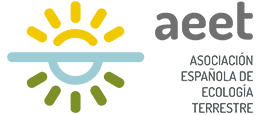Code of conduct
AEET is composed of people who are acutely aware of the value of diversity. We understand that fostering diversity within our collective is the only way to generate an enriching, inclusive atmosphere that promotes novel ideas, ways of thinking, and projects towards a better understanding of terrestrial ecology and towards answering the current biodiversity crisis.
From the AEET we want to be an active force in democratizing knowledge and fostering diversity in the academic world, because a diverse and tolerant academic space, mirroring current social realities, is a key pillar of the knowledge society. Our goal is to help fellow ecologists to develop their careers in the field and position of their choice, be it teaching, research, or management. Likewise, ecologists need to be able to carry out the tasks associated with their job (lab or fieldwork, paleontological excavations, oceanographic campaigns, conference talks/networking, assistance to courses, etc) without any type of discrimination or abuse, independent of their gender identity, sexual orientation, functional diversity, origin, religious beliefs, etc.
In the academic world, certain abusive and discriminatory behaviours have been tolerated by erroneously assuming that these are personality traits that do not affect the professional merit or performance of researchers. However, abusive behaviours negatively affect the careers of those who suffer from them. We are conscious that, unfortunately, the academic world has a hierarchical structure, and this tends to hide and perpetuate power abuses that are, furthermore, disproportionately suffered by vulnerable groups and minorities.
We know that most people taking part in our activities are students and professionals in unstable positions, who are especially vulnerable to different types of abuse. Therefore, we have decided to establish several measures to protect this diverse and large collective. From the AEET we will ensure that diversity is respected and upheld. In our events, we want to prioritize the well-being of participants, especially of the most vulnerable ones. We will not tolerate any form of abuse, discrimination, or degrading treatment. This includes:
- Negative comments related to a person’s gender, sexual orientation, origin, functional diversity, religion, age, or physical appearance.
- Negative comments related to a person’s lifestyle, dietary choices, or health.
- Negative or discrediting comments related to a person’s professional career or work.
- Sustained interruptions in talks or conversations with colleagues.
- Deliberate intimidatory behaviour.
- Online harassment in any social media platform.
- Offensive or discriminatory jokes and mockery.
- Reiterated requests for intimate relationships after being rejected.
- Threats.
- The use of any person’s identity aspects to discredit or humiliate them.
- NOT using a person’s name and gender.
We want to guarantee, as much as possible, that all participants can profit from AEET activities (disseminate their research, meet other colleagues, learn from other researchers, etc.) in complete freedom, independently of their gender, sexual orientation, functional diversity, origin, religion, and their academic status and career stability.
Therefore, researchers that do not abide by this code of conduct will be cautioned according to the severity of the situation. The established protocol will involve gradual steps, from personal admonition to the expulsion of the event in question without reimbursement. If need be, participation in other AEET events may be prevented or AEET membership revoked, as there is a high frequency of reiteration in such behaviours. In parallel, according to the severity of the situation, the infraction will be reported to the competent authorities, evaluating life-long membership revocation, as well as the withdrawal of AEET related awards or distinctions and veto to any AEET activities.
For reporting abusive behaviours during an event, or any other doubt related to this issue, please write to confidencial@aeet.org*. We understand that it is not easy to publicly denounce a colleague, especially when one is in an unstable position or is starting to work in a certain field. Therefore, our commitment is to help the denouncer and maintain their anonymity.
This code of conduct is inspired by others, such as the community of R developers, associations of Biogeography, and of Ecology.
* Only two female delegates of the equity commission and one member of the AEET board (Ainhoa Magrach) will have access to this information, and it will never be shared in any form without the explicit consent of the denouncer.


